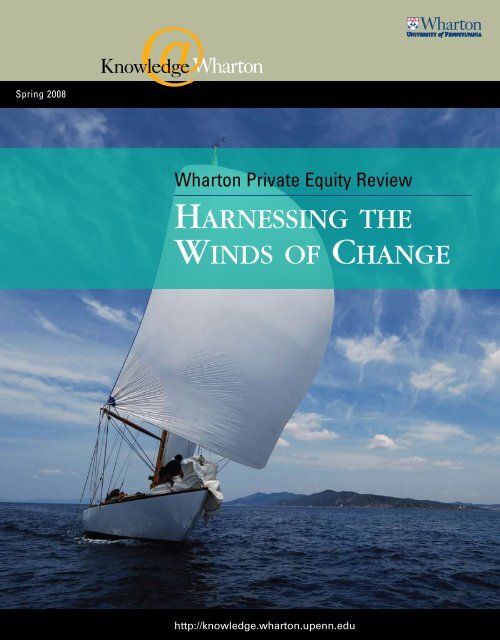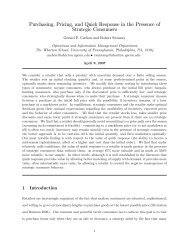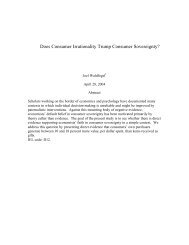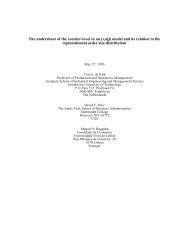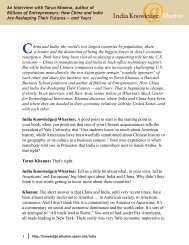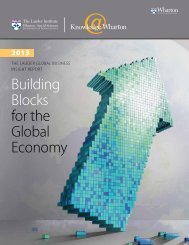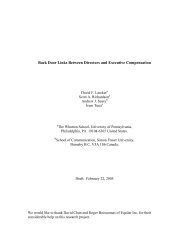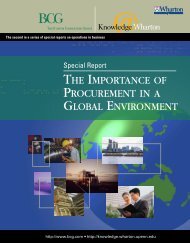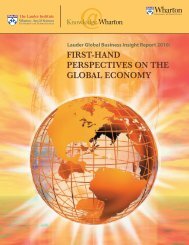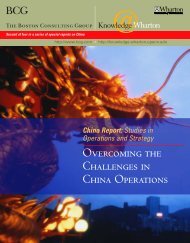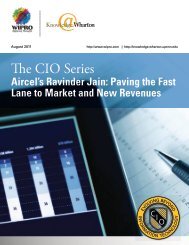harnessing the winds of change - Knowledge@Wharton - University ...
harnessing the winds of change - Knowledge@Wharton - University ...
harnessing the winds of change - Knowledge@Wharton - University ...
Create successful ePaper yourself
Turn your PDF publications into a flip-book with our unique Google optimized e-Paper software.
The Spring first 2008<br />
in a series <strong>of</strong> Wharton Private Equity Reviews<br />
Wharton Private Equity Review<br />
Harnessing tHe<br />
Winds <strong>of</strong> CHange<br />
http://knowledge.wharton.upenn.edu
spo n s o r s<br />
PRIVATE EQUITY SERVICES
Spring 2008 Wharton Private Equity Review<br />
Harnessing tHe<br />
Winds <strong>of</strong> CHange<br />
Executive Editors<br />
Teoman Ozsan (WG’09)<br />
Manoneet Singh (WG’09)<br />
Sumit Sinha (WG’08)<br />
Marketing Team<br />
Karina Danilyuk (WG’09)<br />
Dimple Khurana (WG’08)<br />
Advisory Board<br />
Michael Kopelman (WG’05)<br />
Principal, Edison Venture<br />
Dean Miller (WG’99)<br />
Managing Director, Novitas Capital<br />
Vinay Nair<br />
Senior Fellow, Wharton Financial<br />
Institutions Center<br />
Stephen Sammut (WG’84)<br />
Senior Fellow, Wharton Health Care<br />
Systems and Lecturer, Wharton<br />
Entrepreneurial Programs and Venture<br />
Partner, Burrill & Company<br />
Jason Wright (WG’00)<br />
Partner, Apax Partners<br />
Con t e n t s<br />
Following <strong>the</strong> Era <strong>of</strong> Large Buyouts, Private Equity Funds<br />
Find New Ways to Compete Page 2<br />
Now that credit has dried up, <strong>the</strong> future <strong>of</strong> large private equity buyouts has become uncertain. Today,<br />
buyout firms are looking to compete in middle-market and foreign deals and, in many cases, are<br />
teaming up with strategic buyers and corporations in new types <strong>of</strong> transactions. According to PE firm<br />
partners and o<strong>the</strong>r industry experts, <strong>the</strong> economic downturn has also paved <strong>the</strong> way for a resurgence<br />
in distressed investing, as lenders and investors alike begin to adjust to new pricing realities.<br />
Private Equity Abroad: Despite <strong>the</strong> Credit Crunch, Opportunities<br />
in Developed Markets Are Waiting Page 6<br />
With <strong>the</strong> collapse <strong>of</strong> credit markets, private equity funds are increasingly willing to tread into unknown<br />
territory to find new deals abroad. While international buyers continue to increase <strong>the</strong>ir presence in<br />
<strong>the</strong> U.S., opportunities for investment in Europe and Asia are equally abundant, according to private<br />
equity experts. Although individual markets have <strong>the</strong>ir inherent challenges, adopting a global strategy<br />
may be one approach to wea<strong>the</strong>ring <strong>the</strong> current economic slowdown.<br />
Will Changes in Taxation Affect <strong>the</strong> Competitiveness <strong>of</strong><br />
U.S. Private Equity? Page 9<br />
At <strong>the</strong> 2008 Wharton Private Equity Conference, <strong>the</strong> topic <strong>of</strong> taxes sparked a lively debate. According<br />
to a panel <strong>of</strong> private equity and legal experts, U.S. congressional proposals to raise taxes on <strong>the</strong> PE<br />
industry could hurt it significantly, and perhaps even force it to move <strong>of</strong>fshore. Given <strong>the</strong> forthcoming<br />
U.S. elections, <strong>the</strong> debate on carried interest may be moot for <strong>the</strong> time being, but <strong>the</strong> panelists agreed<br />
that it’s a hot-button issue.<br />
Setting up Shop: What Does It Take to Establish a<br />
Private Equity Firm in Today’s Market? Page 12<br />
Establishing a private equity fund as a founding partner is <strong>the</strong> objective <strong>of</strong> thousands <strong>of</strong> practitioners<br />
across <strong>the</strong> industry. With <strong>the</strong> market continuing to mature, what are <strong>the</strong> hurdles, and what will it take<br />
to successfully start a private equity shop going forward? A leading private equity fundraising advisor<br />
and two leading investors with extensive experience advising and backing new private equity firms<br />
discussed <strong>the</strong>se issues with members <strong>of</strong> <strong>the</strong> Wharton Private Equity Club (WPEC).<br />
Carlyle Group’s David Rubenstein: ‘The Greatest Period for<br />
Private Equity Is Probably Ahead <strong>of</strong> Us’ Page 18<br />
David Rubenstein is co-founder and managing director <strong>of</strong> The Carlyle Group, <strong>the</strong> Washington,<br />
D.C.-based private equity firm with more than $70 billion in assets under management. In March,<br />
members <strong>of</strong> <strong>the</strong> Wharton Private Equity Club (WPEC) interviewed Rubenstein about <strong>the</strong> ongoing credit<br />
crisis, <strong>the</strong> industry outlook, <strong>the</strong> rise <strong>of</strong> sovereign wealth funds and why private equity is “one <strong>of</strong> <strong>the</strong><br />
greatest exports <strong>of</strong> <strong>the</strong> United States.”
2<br />
Following <strong>the</strong> Era <strong>of</strong> Large Buyouts,<br />
Private Equity Funds Find New Ways to Compete<br />
Nothing symbolized <strong>the</strong> most recent<br />
private equity boom better than huge buyouts,<br />
deals so big that private equity sponsors teamed<br />
up to pull <strong>of</strong>f <strong>the</strong> transactions in so-called<br />
consortium — or “club” — deals that spurred talk<br />
<strong>of</strong> $100 billion transactions.<br />
Now that credit has dried up, <strong>the</strong> future <strong>of</strong> large<br />
private equity buyouts has become uncertain.<br />
Limited by <strong>the</strong> lack <strong>of</strong> available debt financing,<br />
buyout firms are looking to compete in middlemarket<br />
and foreign deals and, in many cases,<br />
are teaming up with strategic buyers and<br />
corporations in new types <strong>of</strong> transactions. Not<br />
surprisingly, <strong>the</strong> economic downturn has also<br />
paved <strong>the</strong> way for a resurgence in distressed<br />
investing, as lenders and investors alike begin to<br />
adjust to new pricing realities.<br />
One major difference in <strong>the</strong> most<br />
recent cycle was <strong>the</strong> amount <strong>of</strong><br />
capital raised.<br />
According to Jack Daly, a managing director at<br />
Goldman Sachs focusing on large-cap leveraged<br />
buyouts in <strong>the</strong> U.S. industrial sector, 2007 was a<br />
“tale <strong>of</strong> two markets.” In <strong>the</strong> first half <strong>of</strong> <strong>the</strong> year,<br />
private equity sponsors enjoyed easy access<br />
to debt which led to previously unthinkable<br />
discussions about deals valued at up to $100<br />
billion. By <strong>the</strong> end <strong>of</strong> <strong>the</strong> year, credit markets had<br />
contracted and <strong>the</strong> industry faced a $350 billion<br />
overhang. Lenders were unable to provide large<br />
financings and included extensive covenants on<br />
<strong>Knowledge@Wharton</strong> Wharton Private Equity Review<br />
<strong>the</strong> loans <strong>the</strong>y did write. “The next $10 billion<br />
deal feels years away,” Daly said.<br />
The only constant was sellers’ high expectations<br />
about <strong>the</strong> value <strong>of</strong> <strong>the</strong>ir businesses, noted Daly,<br />
who participated in a panel discussion about<br />
large buyouts at <strong>the</strong> 2008 Wharton Private Equity<br />
Conference. In <strong>the</strong> face <strong>of</strong> <strong>the</strong> current economic<br />
turmoil, however, those expectations have<br />
begun to drop. The buyout business is cyclical,<br />
he added, noting o<strong>the</strong>r industry boom-and-bust<br />
periods — in <strong>the</strong> late 1980s, <strong>the</strong> late 1990s and<br />
again from 2002 through <strong>the</strong> end <strong>of</strong> 2007. The<br />
public markets experience <strong>the</strong> same ups and<br />
downs, he said.<br />
The latest boom came to an end in <strong>the</strong> usual way.<br />
“What happened was that people got out <strong>of</strong> hand<br />
with some <strong>of</strong> <strong>the</strong> valuations,” he said. Add to<br />
that <strong>the</strong> subprime meltdown and it signaled <strong>the</strong><br />
end <strong>of</strong> <strong>the</strong> industry’s ability to digest deals like<br />
Blackstone Group’s record $36 billion acquisition<br />
in 2006 <strong>of</strong> Equity Office, <strong>the</strong> Chicago-based<br />
commercial real estate investment trust.<br />
One major difference in <strong>the</strong> most recent cycle<br />
was <strong>the</strong> amount <strong>of</strong> capital raised, Daly noted.<br />
The industry has raised about $750 billion<br />
since January 2006 — an amount which, when<br />
levered, would be enough to finance deals worth<br />
a significant portion (15%-25%) <strong>of</strong> <strong>the</strong> Standard<br />
& Poor’s 500. Buyout firms have remained<br />
relatively flush. “There’s still a staggering amount<br />
<strong>of</strong> money sitting <strong>the</strong>re,” said Daly, who added<br />
that companies will find new ways to make deals<br />
work even if <strong>the</strong>re is less debt financing available<br />
from lenders. “There is a tremendous amount<br />
<strong>of</strong> opportunity. There are still going to be a lot <strong>of</strong><br />
ways to make that capital work.”
A Return to Fundamentals<br />
According to Perry Golkin, a partner at Kohlberg<br />
Kravis Roberts and a member <strong>of</strong> <strong>the</strong> firm’s<br />
financial services industry team, <strong>the</strong> markets<br />
are clearly not deep enough to support<br />
huge private equity deals. Instead, sponsors<br />
should focus on smaller transactions, he said.<br />
PricewaterhouseCoopers research shows that <strong>the</strong><br />
volume <strong>of</strong> large buyouts fell <strong>of</strong>f sharply in <strong>the</strong><br />
second half <strong>of</strong> 2007, but that middle-market deals,<br />
valued at up to $1 billion, totaled $355 billion, or<br />
23% <strong>of</strong> U.S. transaction volume.<br />
Lenders are demanding <strong>change</strong>s in covenants,<br />
Golkin said, which represents a return to more<br />
normal conditions after <strong>the</strong> boom period marked<br />
by easy loan terms. The revised covenants do not<br />
represent “radical <strong>change</strong>” but do restrict private<br />
equity firms’ flexibility, he added. “We had some<br />
luxury for a little time, but <strong>the</strong> reality is we will<br />
not have <strong>the</strong> flexibility we were able to negotiate<br />
for <strong>the</strong> last couple <strong>of</strong> years.”<br />
According to Golkin, rising capital costs will<br />
reduce asset prices, and <strong>the</strong> diminished role <strong>of</strong><br />
securitized debt funds will also affect private<br />
equity sponsors. “All <strong>of</strong> <strong>the</strong>se things are going<br />
to make it a little more difficult for a buyer,<br />
or sponsor, to structure a deal in a way that’s<br />
comfortable. You become more nervous.”<br />
The industry will return to fundamentals that<br />
prevailed three or four years ago, he added.<br />
“We’re not moving to <strong>the</strong> Stone Age.”<br />
The largest limiting factor now is that sellers’<br />
expectations have not caught up with <strong>the</strong> new<br />
pricing realities. Golkin noted that as deals<br />
collapse in <strong>the</strong> changing financial environment,<br />
<strong>the</strong> industry is wrestling with <strong>the</strong> question <strong>of</strong><br />
what represents a material <strong>change</strong> in a business<br />
that might trigger a breakup fee. For example, is<br />
a 10% drop in earnings a material development?<br />
The Delaware court system is examining some <strong>of</strong><br />
<strong>the</strong>se issues, he said.<br />
O<strong>the</strong>r questions surround <strong>the</strong> value <strong>of</strong> a reverse<br />
breakup fee, which takes effect when a buyer<br />
walks away from an agreement before it is<br />
completed. Private equity sponsors will need to<br />
look at <strong>the</strong> structure <strong>of</strong> transactions to decide<br />
whe<strong>the</strong>r <strong>the</strong> breakup fee will cover <strong>the</strong> costs <strong>of</strong><br />
terminating a deal. “I don’t think when [breakup<br />
fees] were created, people would have predicted<br />
that financial markets would disappear,” he said.<br />
Greg Mondre, managing director <strong>of</strong> Silver Lake,<br />
<strong>the</strong> technology-focused buyout firm, pointed<br />
out that <strong>the</strong> downturn will make 2008 a more<br />
difficult year to exit from investments. Managers<br />
<strong>of</strong> recently acquired companies will need to<br />
pay close attention to operating fundamentals<br />
because those companies are carrying more<br />
leverage than in <strong>the</strong> past. One advantage for<br />
private equity sponsors in this cycle, he added,<br />
is that most large-cap buyout firms have built<br />
up substantial operating groups with in-house<br />
expertise to help companies move through <strong>the</strong><br />
downturn. “Our ability to actually work with our<br />
costs, restructure operations and drive value<br />
is a huge added benefit going into a time <strong>of</strong><br />
economic weakness.”<br />
The largest limiting factor now is that<br />
sellers’ expectations have not caught<br />
up with <strong>the</strong> new pricing realities.<br />
Private equity sponsors also own better<br />
companies than <strong>the</strong>y did in past downturns,<br />
Mondre noted. During <strong>the</strong> most recent period<br />
<strong>of</strong> private equity expansion, sponsors were able<br />
to acquire an increased number <strong>of</strong> large, stable<br />
companies with leading market positions than in<br />
<strong>the</strong> past. Those are <strong>the</strong> types <strong>of</strong> companies that<br />
are best able to wea<strong>the</strong>r a s<strong>of</strong>t economy. “In any<br />
downturn, it is <strong>the</strong> leaders that come out with <strong>the</strong><br />
highest market share and better margins,” he said.<br />
“The weaker competitors fall by <strong>the</strong> wayside.”<br />
New Models and Markets<br />
On <strong>the</strong> investing side <strong>of</strong> <strong>the</strong> business, a weak<br />
economy creates buying opportunities, Mondre<br />
said. “Historically, <strong>the</strong> best buyout investments<br />
have been made coming out <strong>of</strong> a recessionary<br />
period.” In <strong>the</strong> last five years, capital had become<br />
a commodity; now, because much <strong>of</strong> that<br />
capital has dried up, private equity funds may<br />
play a new role, he noted. Previously, private<br />
equity sponsors used war chests raised from<br />
limited partners to buy out firms. In <strong>the</strong> future,<br />
that money may be a source <strong>of</strong> financing for<br />
companies that are struggling with balance-sheet<br />
problems but do not want to go along with a<br />
buyout. “We can structure minority investments,<br />
Harnessing tHe Winds <strong>of</strong> CHange<br />
3
4<br />
do acquisition finance and o<strong>the</strong>r types <strong>of</strong><br />
structured transactions that are not <strong>the</strong> traditional<br />
‘going private’ that we have seen in <strong>the</strong> last few<br />
years,” Mondre said.<br />
He added that <strong>the</strong> consortium, or club, structure<br />
may still be valuable in smaller transactions<br />
because private equity sponsors can prosper<br />
from one ano<strong>the</strong>r’s strengths. “We benefit from<br />
some level <strong>of</strong> humility. We don’t think our firm<br />
knows everything <strong>the</strong>re is to know,” he said.<br />
“Having one or two o<strong>the</strong>r firms as part <strong>of</strong> a deal<br />
going in from a diligence standpoint, and after<br />
<strong>the</strong> deal’s closed for shared governance and<br />
shared knowledge, is a very valuable thing for<br />
bigger transactions. We actually are happy and<br />
okay with taking a little smaller investment to<br />
bring in those added skills.”<br />
“You will see more situations where<br />
<strong>the</strong>re is a need for capital, and that’s<br />
something private equity can provide.”<br />
Richard Schifter, a partner at Texas Pacific Group<br />
(TPG) with expertise in bankruptcy law and<br />
corporate restructuring, noted that during <strong>the</strong><br />
recent private equity boom corporate executives<br />
turned to private equity because it could supply<br />
capital at lower cost than public financing and<br />
allowed management to escape <strong>the</strong> “limelight”<br />
in <strong>the</strong> post-Enron era <strong>of</strong> public scrutiny and<br />
regulatory reform.<br />
Now, he said, those trends no longer shape<br />
<strong>the</strong> market, but private equity can still play a<br />
role in corporate financing. “You will see more<br />
situations where <strong>the</strong>re is a need for capital, and<br />
that’s something private equity can provide.”<br />
Transactions could involve private equity<br />
partnerships with strategic buyers, or deals in<br />
which companies seek out leverage to avoid<br />
giving up equity. “It may be very opportunistic in<br />
light <strong>of</strong> what’s going on both in <strong>the</strong> economy and<br />
<strong>the</strong> financial markets,” he said.<br />
In fact, some novel transactions have already<br />
emerged: In mid-April, Citigroup confirmed a<br />
sale <strong>of</strong> $12 billion in leveraged loans to TPG, <strong>the</strong><br />
Blackstone Group and Apollo Management —<br />
an attempt by <strong>the</strong> bank to insulate itself from<br />
<strong>Knowledge@Wharton</strong> Wharton Private Equity Review<br />
fur<strong>the</strong>r writedowns on debt, including loans it<br />
made previously to fund transactions at all three<br />
private equity firms.<br />
Recently, sovereign wealth funds, or stateowned<br />
investment funds, have begun stepping<br />
in to provide capital for struggling companies<br />
like Citigroup: In November, <strong>the</strong> Abu Dhabi<br />
Investment Authority, flush with cash thanks<br />
to high oil prices, bought a nearly 5% stake in<br />
Citigroup to help cover losses from subprime<br />
loans and related securities. But while sovereign<br />
funds are clearly on <strong>the</strong> rise, Jordan Hitch,<br />
managing director at Bain Capital, said he does<br />
not view <strong>the</strong>m as significant competitors for<br />
private equity. “They do have capital and certain<br />
people who look for investment opportunities,”<br />
he said, “but not <strong>the</strong> same capabilities as private<br />
equity funds in expertise and global reach.”<br />
In addition to new transaction structures, buyout<br />
firms are looking toward new geographies<br />
to cope with <strong>the</strong> credit crunch. “All <strong>the</strong> major<br />
firms are spending time and energy building<br />
investment teams in Asia,” said Hitch, who noted<br />
that many firms had begun to focus on Europe<br />
several years ago. Firms would also likely turn<br />
to emerging markets like India, South Africa and<br />
Turkey, he added.<br />
A Boom for Distressed Investors<br />
While <strong>the</strong> current down cycle has demanded out<strong>of</strong>-<strong>the</strong>-box<br />
approaches from buyout firms, it has<br />
also created ample opportunity for distressed<br />
investors seeking to buy up <strong>the</strong> securities <strong>of</strong><br />
troubled companies.<br />
“There’s not enough money out <strong>the</strong>re to deal<br />
with all <strong>the</strong> problems,” said Marc Lasry, chairman<br />
and chief executive <strong>of</strong> Avenue Capital Group<br />
in New York, who joined a panel discussion on<br />
distressed investing at <strong>the</strong> Wharton conference.<br />
“[People] are panicking, and things are getting<br />
worse — and <strong>the</strong> more people who believe that,<br />
<strong>the</strong> better it is for us.”<br />
In fact, <strong>the</strong> situation is “unprecedented,”<br />
according to Maria Boyazny, a New York-based<br />
managing director with Siguler Guff. “Over <strong>the</strong><br />
next year, $500 billion in subprime mortgages<br />
are maturing. The cash-debt market gets a lot<br />
<strong>of</strong> press, but even scarier is <strong>the</strong> $1 trillion in<br />
[corporate] leveraged loans that are maturing.”
Lenders and investors alike are only beginning to<br />
grasp <strong>the</strong> new pricing realities that have resulted<br />
from <strong>the</strong> downturn. Recent chaos in <strong>the</strong> market<br />
has been complicating analysis, Boyanzny said,<br />
but some firms may be ignoring <strong>the</strong> market’s<br />
signals because <strong>the</strong>y don’t like what <strong>the</strong>y’re<br />
hearing. “Banks are complaining that <strong>the</strong>re are<br />
no bids for securities that <strong>the</strong>y have to mark to<br />
market,” she said. (Under generally accepted<br />
accounting principles, publicly traded companies<br />
must estimate <strong>the</strong> market value <strong>of</strong> <strong>the</strong>ir tradable<br />
securities each quarter and record that value<br />
on <strong>the</strong>ir books.) “I’m being told that you can<br />
get bids, but you might not like where <strong>the</strong> bid<br />
is. Banks are marking things at 60 [cents on <strong>the</strong><br />
dollar], where <strong>the</strong> active bids are 20. People are<br />
bidding 50 cents on <strong>the</strong> dollar for Triple A debt.”<br />
Many investors are facing rude awakenings<br />
when <strong>the</strong>y try to refinance debts or unload<br />
downgraded bonds. Lasry recalled one investor<br />
who got angry upon being told that <strong>the</strong> discount<br />
he was <strong>of</strong>fering Lasry to buy his bonds wasn’t<br />
steep enough. “I had to remind him that <strong>the</strong> market<br />
price is what someone will pay you, not what<br />
you want to sell for.”<br />
Partly, investors are working through <strong>the</strong><br />
necessary but painful process <strong>of</strong> squeezing out<br />
<strong>the</strong> excesses <strong>of</strong> <strong>the</strong> recent real estate and credit<br />
bubble, when lenders <strong>of</strong>fered a variety <strong>of</strong> new<br />
types <strong>of</strong> loans without fully appreciating <strong>the</strong> risks.<br />
Subprime mortgages, <strong>the</strong> majority <strong>of</strong> which went<br />
to riskier-than-usual borrowers, were among <strong>the</strong>m.<br />
So were so-called “covenant-light” loans, which<br />
placed few restrictions on corporate borrowers.<br />
“The market discounts that lack <strong>of</strong> covenants,”<br />
Lasry said. “Those bonds are now trading at<br />
huge discounts. Without covenants, I’ll pay you<br />
40 or 60 [cents on <strong>the</strong> dollar] instead <strong>of</strong> 80.”<br />
Banks in Europe and Asia were just as loose with<br />
<strong>the</strong>ir lending standards and equally willing to try<br />
unproven products, Boyazny added. As a result,<br />
<strong>the</strong>ir reckoning could come soon, too. Asian<br />
banks might be protected, at least partly, by Asia’s<br />
economic boom, she noted. A surging economy<br />
and rising corporate cash flows can make a<br />
banker’s rashness look like prudent risk-taking.<br />
For buyout firms, though, <strong>the</strong> rapid downturn in<br />
credit markets remains unsettling. “There is a<br />
desire by private equity investors to capitalize on<br />
<strong>the</strong> major dislocation,” Hitch from Bain Capital<br />
said, “but also a fear <strong>of</strong> not really knowing where<br />
<strong>the</strong> bottom is.” F<br />
Harnessing tHe Winds <strong>of</strong> CHange<br />
5
6<br />
Private Equity Abroad:<br />
Despite <strong>the</strong> Credit Crunch, Opportunities in Developed Markets Are Waiting<br />
With <strong>the</strong> collapse <strong>of</strong> credit markets,<br />
firms are increasingly willing to tread into<br />
unknown territory to find new opportunities<br />
abroad. A PricewaterhouseCoopers report on<br />
private equity investment (citing Thomson<br />
Financial data) noted that international buyers<br />
accounted for 23% <strong>of</strong> all U.S. mergers and<br />
acquisitions in <strong>the</strong> first 11 months <strong>of</strong> 2007. These<br />
cross-border deals totaled $354 billion, up 73%<br />
from <strong>the</strong> 2006 full-year total.<br />
“The U.S. is particularly attractive because <strong>the</strong><br />
U.S. dollar is at an all-time low,” Greg Peterson,<br />
a partner in PricewaterhouseCoopers Transaction<br />
Services, stated in a press release about <strong>the</strong> report.<br />
“There’s plenty <strong>of</strong> business to do,<br />
particularly in <strong>the</strong> UK, Germany, France<br />
and <strong>the</strong> Nordic countries.”<br />
Opportunities for investment in Europe and<br />
Asia are equally abundant, say private equity<br />
experts. Although individual markets have <strong>the</strong>ir<br />
inherent challenges, adopting a global strategy<br />
may be one approach to wea<strong>the</strong>ring <strong>the</strong> current<br />
economic slowdown.<br />
“There’s massive potential for private equity<br />
[in Europe],” said Vince O’Brien, director <strong>of</strong><br />
London-based Montagu Private Equity and<br />
immediate past chairman <strong>of</strong> <strong>the</strong> British Venture<br />
Capital Association. O’Brien, who participated<br />
in a panel discussion with o<strong>the</strong>r industry<br />
experts from Europe and Japan at <strong>the</strong> 2008<br />
Wharton Private Equity Conference, noted that<br />
<strong>Knowledge@Wharton</strong> Wharton Private Equity Review<br />
an analysis by Montagu found <strong>the</strong> total <strong>of</strong> all<br />
private equity deals in Europe in 2006 to be $150<br />
billion, compared with <strong>the</strong> $12 trillion to $13<br />
trillion total value <strong>of</strong> European stock ex<strong>change</strong>s.<br />
“We’re actually a small portion <strong>of</strong> <strong>the</strong> European<br />
economic environment. In Western Europe, we<br />
do have a very attractive, strong private equity<br />
industry and I think <strong>the</strong>re’s plenty <strong>of</strong> business to<br />
do, particularly in <strong>the</strong> UK, Germany, France and<br />
<strong>the</strong> Nordic countries.”<br />
The London private equity firm 3i, with $16<br />
billion under management, expanded in Europe<br />
10 years ago and now has 60% <strong>of</strong> its assets<br />
outside <strong>the</strong> United Kingdom. In Asia, it is focused<br />
on India, China and Sou<strong>the</strong>ast Asia. Patrick<br />
Dunne, group communications director, said 3i<br />
views Asia as a “triple play.” First, Asia represents<br />
a chance to make high-growth investments,<br />
he noted. Second, 3i has learned through its<br />
European portfolio companies that firms in<br />
developed countries need access to emerging<br />
economies in Asia. Third, he said, Asia is a hot<br />
market for exits. Companies that expected to<br />
exit private equity ownership in 7 to 10 years<br />
are exiting after only a few years amid a “flood”<br />
<strong>of</strong> exits expected to continue in China and<br />
Sou<strong>the</strong>ast Asia in <strong>the</strong> next two years. “We have<br />
underestimated dramatically how quickly exits<br />
would come in Asia,” Dunne said.<br />
UK investors <strong>of</strong>ten question whe<strong>the</strong>r taking a<br />
minority stake in a Chinese company is “sheer<br />
madness,” Dunne added, because <strong>of</strong> corruption<br />
and state intervention in markets. On <strong>the</strong> contrary,<br />
his firm has had more problems with flat-out<br />
accounting fraud in Germany and Italy than with<br />
any problem in China or o<strong>the</strong>r Asian nations.
“We’ve made mistakes along <strong>the</strong> way — some<br />
<strong>of</strong> <strong>the</strong>m hugely entertaining, some less so — but<br />
in terms <strong>of</strong> potential, our continental European<br />
business is 40%, and I think Asia has <strong>the</strong> potential<br />
to exceed that quite soon,” Dunne said.<br />
Hiroshi Nonomiya, representative director and<br />
managing director <strong>of</strong> RHJ International Japan<br />
in Tokyo, specializes in industries including<br />
automotive parts and financial services, as<br />
well as cross-border roll-ups. He said private<br />
equity opportunities in <strong>the</strong> Japanese market<br />
are growing as a result <strong>of</strong> spin-<strong>of</strong>fs from<br />
conglomerates that have grown too large to<br />
effectively manage <strong>the</strong>ir subsidiaries.<br />
The biggest challenge in developing private<br />
equity deals in Japan, he noted, is persuading<br />
CEOs to sell a business unit. CEOs and company<br />
presidents are typically capping <strong>of</strong>f careers <strong>of</strong> 35<br />
years or more and are not interested in upsetting<br />
<strong>the</strong> status quo with a private equity transaction.<br />
Compared with <strong>the</strong>ir counterparts in <strong>the</strong> United<br />
States and o<strong>the</strong>r countries, Japanese executives<br />
hold less equity in companies and have less to<br />
gain from a leveraged buyout. “In many cases,<br />
<strong>the</strong>y want to spend those last two or three years<br />
peacefully,” Nonomiya said.<br />
A Pan-European Approach<br />
Colm O’Sullivan, principal with PAI Partners, a<br />
pan-European private equity fund spun out <strong>of</strong><br />
French Banc Paribus in 1999, said his firm has<br />
investments spread across nine countries. More<br />
than half <strong>of</strong> <strong>the</strong> companies PAI looks at operate<br />
in more than one country and most are pan-<br />
European or global. “They <strong>of</strong>ten have assets in<br />
more than one market, but if <strong>the</strong>y are in only one<br />
market, I can almost guarantee that over time <strong>the</strong>y<br />
will become a pan-European company,” he said.<br />
Since <strong>the</strong> introduction <strong>of</strong> <strong>the</strong> euro, consolidation<br />
in Europe has accelerated, O’Sullivan noted. Still,<br />
vendors, management teams and regulators<br />
can be very country-specific. A pan-European<br />
approach can give private equity firms <strong>the</strong> ability<br />
to both envision an opportunity and put it into<br />
motion. To do that, O’Sullivan’s firm maintains<br />
a matrix organization. “We look at assets right<br />
across Europe and across sectors,” he said, “and<br />
<strong>the</strong>n we have local <strong>of</strong>fices in Madrid, London,<br />
Munich and Milan where we try to have <strong>the</strong> local<br />
content, someone who speaks <strong>the</strong> languages<br />
who’s an insider in <strong>the</strong> market locally.”<br />
This allows <strong>the</strong> firm to be aware <strong>of</strong> <strong>the</strong><br />
regulations and intricacies <strong>of</strong> doing business in<br />
<strong>the</strong> country, he said. “But also we can see deal<br />
opportunities across Europe and opportunities<br />
to combine companies, or ways in which we can<br />
compete and learn lessons from elsewhere.”<br />
That approach has provided PAI Partners with<br />
insights into France, for example, that not all<br />
competitors may have. “The external pessimism<br />
about restructuring and redundancies in France<br />
is a great barrier to entry to o<strong>the</strong>r people coming<br />
into our market because we can be more<br />
confident about what it will cost and how quickly<br />
we can do it in terms <strong>of</strong> restructuring, closing<br />
factories, etc. And so it gives you a certain higher<br />
expected value, because you’re more certain <strong>of</strong><br />
<strong>the</strong> probability <strong>of</strong> success and what <strong>the</strong> costs are.”<br />
A pan-European approach can give<br />
private equity firms <strong>the</strong> ability to both<br />
envision an opportunity and put it<br />
into motion.<br />
The Challenge <strong>of</strong> France<br />
Thierry Timsit, managing partner and c<strong>of</strong>ounder<br />
<strong>of</strong> Astorg Partners, which specializes in midmarket<br />
buyouts in France, said France is <strong>of</strong>ten<br />
depicted as one <strong>of</strong> <strong>the</strong> most difficult European<br />
markets to address for foreigners. “We<br />
don’t speak English. We hate capitalism and<br />
globalization. We love smelly cheeses and our<br />
president [is married to] a top Italian model. This<br />
is not easy to address for Anglo-Saxon investors.”<br />
According to Timsit, France has a large number<br />
<strong>of</strong> family businesses spawned by post-World<br />
War II entrepreneurs who are having trouble with<br />
succession plans and would like to find a way<br />
to liquidate at least some <strong>of</strong> <strong>the</strong>ir equity. Half <strong>of</strong><br />
Astorg’s business is with family-owned firms,<br />
with owners reinvesting 25% to 49% <strong>of</strong> <strong>the</strong> firm’s<br />
value, he said.<br />
Harnessing tHe Winds <strong>of</strong> CHange<br />
7
8<br />
Ano<strong>the</strong>r strong market is spin-<strong>of</strong>fs from<br />
large corporations that were created by <strong>the</strong><br />
government from <strong>the</strong> 1950s through <strong>the</strong> 1990s<br />
and that are now being turned over to private<br />
investment. “That has created bread and butter<br />
for private equity players stripping out <strong>the</strong>se<br />
large corporates,” Timsit said. He noted that it is<br />
more difficult to take public companies private<br />
in France than in <strong>the</strong> United States because <strong>of</strong><br />
tax rules and o<strong>the</strong>r regulations. For example, to<br />
deduct interest on loans, private equity sponsors<br />
must control 95% <strong>of</strong> <strong>the</strong> target firm. In addition,<br />
conditional <strong>of</strong>fers are not permitted.<br />
Timsit acknowledged that French companies are<br />
required to <strong>of</strong>fer rich benefits and protections<br />
to labor, but at least those costs are clear to<br />
acquirers, he said. “When you know that in<br />
advance, it’s not going to get any worse. The only<br />
way it will move is to get better.”<br />
Proprietary Deals<br />
When it comes to deal sourcing in Europe and<br />
o<strong>the</strong>r developed markets, proprietary deals<br />
seem to be a thing <strong>of</strong> <strong>the</strong> past — or at least<br />
fraught with hidden complexity. “First <strong>of</strong> all,”<br />
Timsit said, “no deal is proprietary. I mean <strong>the</strong><br />
only proprietary deal is <strong>the</strong> vendor. Anyone can<br />
claim <strong>the</strong>y own <strong>the</strong> deal, but <strong>the</strong> real owner is <strong>the</strong><br />
owner <strong>of</strong> <strong>the</strong> company.”<br />
Where proprietary deals do exist, Timsit said,<br />
<strong>of</strong>ten complications exist, too. Timsit’s firm<br />
concentrates on “complex situations where<br />
we have conflicting shareholders or regulatory<br />
hurdles which are very French-specific, or<br />
virtually no free cash flow or very poor<br />
bankability <strong>of</strong> <strong>the</strong> deal. In <strong>the</strong>se situations, you<br />
sometimes find a proprietary deal or deals where<br />
<strong>the</strong> owner is ready to talk to you without an<br />
investment bank.”<br />
Even so, he said, <strong>the</strong> owner is going to talk to<br />
someone else to see whe<strong>the</strong>r he’s getting a fair<br />
price. “In that case, he normally continues with<br />
you if you’ve been fair,” Timsit said.<br />
Montagu’s O’Brien said ano<strong>the</strong>r sourcing strategy<br />
was to groom prospects. “All <strong>of</strong> our origination<br />
effort is actually targeted at <strong>the</strong> CEO <strong>of</strong> a large<br />
<strong>Knowledge@Wharton</strong> Wharton Private Equity Review<br />
subsidiary who perhaps is running a good<br />
company and perhaps we think may be non-core<br />
one day.” The strategy has paid <strong>of</strong>f a few times.<br />
“We’ve found CEOs, we’ve gone to vendors<br />
—usually private groups — and we’ve caught<br />
<strong>the</strong>m at just <strong>the</strong> right time. They’ve said, ‘Well, if<br />
you can do it in eight weeks, you can have it.’ But<br />
it’s rare.”<br />
More straightforward situations usually mean<br />
competition. “If you’re chasing plain-vanilla deals,”<br />
Timsit said, “it gets very much intermediated, and<br />
[<strong>the</strong>re are] no proprietary deals.”<br />
Effects <strong>of</strong> <strong>the</strong> Credit Crisis<br />
The credit crisis is being felt differently around<br />
<strong>the</strong> world. In Japan, <strong>the</strong> impact has not been so<br />
harsh, because <strong>the</strong> economy did not participate<br />
as much as o<strong>the</strong>r nations in <strong>the</strong> recent boom,<br />
Nonomiya said. “Fortunately or unfortunately,<br />
Japanese banks were not so invested in<br />
subprime products.” Japanese banks are still<br />
aggressive in debt financing, but “if we look<br />
for much bigger deals with international banks,<br />
<strong>the</strong>n we have limitations.” He noted that many<br />
Japanese companies are highly leveraged.<br />
Timsit said European loan default rates are at<br />
historic lows <strong>of</strong> less than 2%, although <strong>the</strong> cost<br />
<strong>of</strong> debt is rising. His firm has financed two deals<br />
since <strong>the</strong> credit crisis erupted and <strong>the</strong> banks<br />
involved in those transactions have demanded<br />
more due diligence than <strong>the</strong>y had beforehand.<br />
“It’s going to be a more lengthy process to get<br />
debt. The cost <strong>of</strong> debt is rising, but we’re coming<br />
from a point in Europe that was much lower than<br />
in <strong>the</strong> U.S,” he said.<br />
According to Dunne, <strong>the</strong> contraction in credit<br />
markets has had a chilling effect on large<br />
transactions in Europe, but mid-market deals are<br />
still being financed. He said broader economic<br />
weakness that may result from <strong>the</strong> credit squeeze<br />
is a bigger concern. “The big influence that no<br />
one is actually near estimating is <strong>the</strong> macro<br />
impact <strong>of</strong> this. The price <strong>of</strong> debt is one thing, but<br />
actually two-thirds <strong>of</strong> <strong>the</strong> business is in earnings<br />
growth,” he said. “We’re more interested in <strong>the</strong><br />
price <strong>of</strong> earnings than <strong>the</strong> price <strong>of</strong> debt.” F
Will Changes in Taxation Affect <strong>the</strong> Competitiveness <strong>of</strong> U.S. Private Equity?<br />
Supreme Court Justice John Marshall<br />
famously declared that <strong>the</strong> power to tax is <strong>the</strong><br />
power to destroy. At <strong>the</strong> 2008 Wharton Private<br />
Equity Conference, industry experts invoked<br />
Marshall in spirit, if not in name. The typically<br />
tedious topic <strong>of</strong> taxes sparked a lively — and<br />
occasionally acid — debate among members <strong>of</strong><br />
a conference panel titled, “The Impact <strong>of</strong> <strong>the</strong> U.S.<br />
Tax and Legal Environment on Private Capital<br />
Competitiveness.”<br />
According to some industry experts, U.S.<br />
congressional proposals to raise taxes on <strong>the</strong>ir<br />
industry could hurt it significantly, and perhaps<br />
even force it to move <strong>of</strong>fshore.<br />
Given <strong>the</strong> forthcoming U.S. elections and <strong>the</strong><br />
likelihood <strong>of</strong> a broader tax discussion next year,<br />
<strong>the</strong> debate on carried interest may be moot for<br />
<strong>the</strong> moment, but <strong>the</strong> panelists agreed that it’s a<br />
hot-button issue.<br />
“Carried interest” refers to <strong>the</strong> portion <strong>of</strong> a<br />
private equity fund’s pr<strong>of</strong>its that <strong>the</strong> fund<br />
manager receives. In <strong>the</strong> common “2 and 20”<br />
arrangement, for example, <strong>the</strong> manager typically<br />
gets payouts <strong>of</strong> 2% <strong>of</strong> <strong>the</strong> capital committed to<br />
<strong>the</strong> fund as a management fee, as well as 20% <strong>of</strong><br />
<strong>the</strong> fund’s capital gains as carried interest.<br />
Since Congress lowered <strong>the</strong> tax rate on capital<br />
gains to 15% in <strong>the</strong> 1990s, carried interest has<br />
been taxed at that rate, instead <strong>of</strong> <strong>the</strong> higher<br />
tax rate for ordinary income. Critics say that’s<br />
inappropriate because private equity managers<br />
don’t have to risk <strong>the</strong>ir own money to receive<br />
<strong>the</strong>ir share <strong>of</strong> <strong>the</strong> pr<strong>of</strong>its. Thus, <strong>the</strong> argument<br />
goes, <strong>the</strong>y’re being compensated for <strong>the</strong>ir<br />
services and should be taxed at <strong>the</strong> ordinary<br />
income tax rate. (Private equity managers can<br />
invest in <strong>the</strong> investment pools that <strong>the</strong>y manage.<br />
When <strong>the</strong>y do, <strong>the</strong> return on this money is taxed,<br />
without controversy, at <strong>the</strong> capital gains rate.)<br />
Last year, Congress proposed taxing carried<br />
interest at <strong>the</strong> ordinary income tax rate, typically<br />
35% for high earners. Not surprisingly, that set<br />
<strong>of</strong>f a firestorm <strong>of</strong> protest in <strong>the</strong> private equity<br />
industry.<br />
Mark Heesen, president <strong>of</strong> <strong>the</strong> National Venture<br />
Capital Association, summarized <strong>the</strong> industry’s<br />
point <strong>of</strong> view. “Historically, <strong>the</strong> Treasury<br />
Department and <strong>the</strong> IRS have said that carried<br />
interest is considered capital gains,” he said. “I’ve<br />
worked with <strong>the</strong> Treasury on many issues, and<br />
never was <strong>the</strong>re any talk about this being a faulty<br />
premise. Then you fast forward to today, and you<br />
hear <strong>the</strong>se arguments that all we do is provide<br />
a service, and our pay should be exactly like a<br />
janitor’s pay. But we’re more akin to founders<br />
and owners <strong>of</strong> companies than employees.”<br />
Last year, Congress proposed taxing<br />
carried interest at <strong>the</strong> ordinary<br />
income tax rate, typically 35% for<br />
high earners.<br />
Owners or Employees?<br />
Charles Kingson, a lecturer at <strong>the</strong> <strong>University</strong> <strong>of</strong><br />
Pennsylvania’s law school, said that legal logic<br />
contradicted <strong>the</strong> industry’s position. “Carried<br />
interest treatment implies you have an interest<br />
Harnessing tHe Winds <strong>of</strong> CHange<br />
9
10<br />
in <strong>the</strong> property,” he said. “The fact that your<br />
compensation is measured by <strong>the</strong> size <strong>of</strong> an asset<br />
doesn’t mean that you own that asset. A jockey<br />
who gets 10% <strong>of</strong> a purse doesn’t own <strong>the</strong> horse.”<br />
Instead <strong>of</strong> being paid for <strong>the</strong> use <strong>of</strong> <strong>the</strong>ir capital,<br />
as owners are, private equity managers get<br />
compensated for <strong>the</strong>ir “skill and knowledge,”<br />
Kingson said. They typically manage o<strong>the</strong>r<br />
people’s money, not <strong>the</strong>ir own, so <strong>the</strong>y’re more<br />
akin to employees than entrepreneurs. “It’s like<br />
comparing a newspaper reporter to J.K. Rowling,”<br />
author <strong>of</strong> <strong>the</strong> Harry Potter books, he said. “When<br />
J.K. Rowling writes a book, she carries all <strong>of</strong><br />
<strong>the</strong> risk. When a newspaper reporter writes a<br />
story, his paper carries <strong>the</strong> risk, and he’s paid<br />
for his services — just like a private equity fund<br />
manager should be.”<br />
Legal considerations aside, changing<br />
<strong>the</strong> taxation <strong>of</strong> private equity could<br />
hurt one <strong>of</strong> <strong>the</strong> most vital sectors <strong>of</strong><br />
<strong>the</strong> economy, one panelist said.<br />
Private equity managers also fail ano<strong>the</strong>r legal<br />
test, he argued. When <strong>the</strong>y sell a company in<br />
<strong>the</strong>ir portfolio, <strong>the</strong>y’re not selling goodwill — that<br />
is, intangible assets like reputation and customer<br />
relationships — that <strong>the</strong>y have created in <strong>the</strong>ir<br />
business. “Look at <strong>the</strong> guy who owns a hardware<br />
store,” he said. “If he sells out, he’ll get capitalgains<br />
treatment because he created <strong>the</strong> goodwill.<br />
He’s selling his intangible assets in a one-shot<br />
deal and packing up for Florida. Fund managers<br />
aren’t selling <strong>the</strong>ir goodwill. They’re continuing to<br />
use <strong>the</strong>ir goodwill.”<br />
Tom Bell, a New York-based partner with <strong>the</strong><br />
law firm Simpson, Thacher & Bartlett, argued<br />
that <strong>the</strong> role <strong>of</strong> private equity managers wasn’t<br />
as clear-cut as Kingson portrayed it. They don’t<br />
simply sell <strong>the</strong>ir skills <strong>the</strong> way a lawyer or doctor<br />
does, he said. Instead, <strong>the</strong>y’re entrepreneurs who<br />
contribute sweat equity to <strong>the</strong> betterment and,<br />
ultimately, pr<strong>of</strong>itability <strong>of</strong> <strong>the</strong> companies in <strong>the</strong>ir<br />
portfolios. “If you and I set up a company and<br />
I contribute sweat equity, I’ll get capital gains<br />
when <strong>the</strong> asset is sold,” he pointed out.<br />
<strong>Knowledge@Wharton</strong> Wharton Private Equity Review<br />
Legal considerations aside, changing <strong>the</strong> taxation<br />
<strong>of</strong> private equity could hurt one <strong>of</strong> <strong>the</strong> most vital<br />
sectors <strong>of</strong> <strong>the</strong> economy, he said. “In most <strong>of</strong> <strong>the</strong><br />
rest <strong>of</strong> <strong>the</strong> world, <strong>the</strong> taxation is lower for carried<br />
interest. It’s lower in <strong>the</strong> UK and Germany. In a<br />
globalized economy, where will <strong>the</strong> pr<strong>of</strong>its go<br />
[if <strong>the</strong>se proposals are enacted]?” Firms and<br />
<strong>the</strong>ir pr<strong>of</strong>essionals would migrate ra<strong>the</strong>r than<br />
pay steeply higher levies in <strong>the</strong> United States,<br />
he suggested. Bell also questioned lawmakers’<br />
motivation in trying to raise taxes on private<br />
equity firms. “Members <strong>of</strong> Congress who are<br />
making <strong>the</strong>se proposals aren’t trying to do<br />
neutral tax policy,” he said. “They’re trying to nail<br />
one group.”<br />
An Industry under Scrutiny<br />
The private equity industry has come under<br />
scrutiny lately because <strong>of</strong> <strong>the</strong> wealth <strong>of</strong> some<br />
<strong>of</strong> its best-known practitioners and because<br />
<strong>of</strong> political concerns over growing income<br />
inequality. Stephen Schwarzman, billionaire<br />
chairman <strong>of</strong> The Blackstone Group, for example,<br />
became a lightning rod after throwing himself a<br />
lavish birthday party in New York last year. The<br />
red-carpet bash, reported to have cost more than<br />
$3 million, included a private concert by Rod<br />
Stewart. Schwarzman’s firm went public last year<br />
in a deal that netted him more than $600 million<br />
in cash and valued his stake at more than $5<br />
billion at <strong>the</strong> time <strong>of</strong> <strong>the</strong> transaction. (Blackstone<br />
shares have since fallen.)<br />
Some politicians, perhaps trying to stir populist<br />
passions, have complained <strong>of</strong> a new Gilded Age<br />
in which financiers like Schwarzman potentially<br />
pocket hundreds <strong>of</strong> millions for making private<br />
equity deals while working people worry about<br />
stagnating paychecks. Kingson, for one, was<br />
sympa<strong>the</strong>tic to <strong>the</strong> populist perspective. “The<br />
idea that <strong>the</strong> buyout people think that <strong>the</strong>y<br />
should be favored by <strong>the</strong> tax law is incredible,”<br />
he said. “They make a lot <strong>of</strong> money by savaging<br />
<strong>the</strong> tax law.” He also took issue with <strong>the</strong> notion<br />
that higher taxes would push private equity<br />
firms abroad. “In 1963, <strong>the</strong> top tax rate was 91%<br />
and people still wanted to become lawyers. Tax<br />
is a factor in economic decisions, but it’s not<br />
determinative.”<br />
Jeff Peck, chairman <strong>of</strong> Johnson, Madigan, Peck,<br />
Boland & Stewart, a Washington lobbying firm,
pointed out that, for now, <strong>the</strong> debate over carried<br />
interest is probably moot. After threatening<br />
higher taxes last year, Congress chose not to<br />
act, giving <strong>the</strong> industry a reprieve. Legislators<br />
probably won’t move forward with a carriedinterest<br />
measure this year because <strong>of</strong> <strong>the</strong><br />
election, he said. The earliest that <strong>the</strong>y would<br />
revisit <strong>the</strong> issue would be 2009. By <strong>the</strong>n, “you’re<br />
going to see a new president and probably<br />
larger Democratic majorities in both houses <strong>of</strong><br />
Congress,” he predicted.<br />
Chances are, <strong>the</strong> Democrats will <strong>the</strong>n want to<br />
pursue broad-based taxation <strong>change</strong>s modeled<br />
after, say, <strong>the</strong> Tax Reform Act <strong>of</strong> 1986 in which<br />
Congress lowered tax rates in all income brackets<br />
by removing a raft <strong>of</strong> loopholes. “We’re past <strong>the</strong><br />
point <strong>of</strong> carried interest being a solo tax issue,”<br />
he said. “It will be caught up in <strong>the</strong> larger tax<br />
reform debate.”<br />
Heesen, <strong>of</strong> <strong>the</strong> Venture Capital Association,<br />
agreed that <strong>the</strong> industry had been spared for<br />
now. “Congress is looking at a stimulus package<br />
[for <strong>the</strong> economy] right now, so <strong>the</strong>y’re not going<br />
to destimulate venture capital and buyouts. It’s<br />
very difficult to see <strong>the</strong>m taking up a carriedinterest<br />
provision in 2008 because <strong>of</strong> <strong>the</strong> election<br />
and <strong>the</strong> stimulus package.” F<br />
“We’re past <strong>the</strong> point <strong>of</strong> carried<br />
interest being a solo tax issue. It<br />
will be caught up in <strong>the</strong> larger tax<br />
reform debate.”<br />
Harnessing tHe Winds <strong>of</strong> CHange<br />
11
12<br />
Setting up Shop:<br />
What Does It Take to Establish a Private Equity Firm in Today’s Market?<br />
Establishing a private equity fund as a<br />
founding partner is <strong>the</strong> objective <strong>of</strong> thousands<br />
<strong>of</strong> practitioners across <strong>the</strong> industry. For <strong>the</strong><br />
fortunate few, success has involved talent, good<br />
timing and perseverance combined with industry<br />
growth that has supported <strong>the</strong> entry <strong>of</strong> new firms.<br />
With <strong>the</strong> market continuing to mature, what are<br />
<strong>the</strong> hurdles, and what will it take to successfully<br />
start a private equity shop going forward? A<br />
leading private equity fundraising advisor and<br />
two leading investors with extensive experience<br />
advising and backing new private equity firms<br />
discussed <strong>the</strong>se issues with members <strong>of</strong> <strong>the</strong><br />
Wharton Private Equity Club (WPEC).<br />
Most spin-outs today are <strong>the</strong> result<br />
<strong>of</strong> younger partners developing into<br />
full partners with <strong>the</strong> desire to have<br />
more <strong>of</strong> <strong>the</strong> carry and more influence<br />
within <strong>the</strong>ir respective firms.<br />
Greg Myers is managing director <strong>of</strong> <strong>the</strong> Private<br />
Fund Advisory Group at Lazard & Co. He has<br />
12 years <strong>of</strong> experience advising private equity<br />
firms across Europe, <strong>the</strong> United States and Asia<br />
on fundraising transactions. Currently based<br />
in London, Myers is responsible for Lazard’s<br />
European and Asian fundraising origination and<br />
execution activities.<br />
Mike Pilson is director <strong>of</strong> Private Equities at<br />
DuPont Capital Management. He has 12 years’<br />
<strong>Knowledge@Wharton</strong> Wharton Private Equity Review<br />
experience in private equity fund investment and<br />
investment banking. Pilson currently oversees a<br />
$3 billion portfolio comprising over 100 private<br />
equity fund interests.<br />
Rick Slocum (WG’85) is director <strong>of</strong> Private<br />
Investments at <strong>the</strong> Robert Wood Johnson<br />
Foundation. Slocum has 27 years <strong>of</strong> experience<br />
across private equity fund investment, direct<br />
investment and investment banking and was<br />
most recently senior director <strong>of</strong> investments<br />
at <strong>the</strong> <strong>University</strong> <strong>of</strong> Pennsylvania. He currently<br />
oversees a $2.5 billion portfolio in commitments<br />
with investments in private equity, venture<br />
capital, growth equity, distressed investing,<br />
opportunistic credit and real assets.<br />
WPEC: In your experience, what are <strong>the</strong> different<br />
pr<strong>of</strong>iles <strong>of</strong> new private equity firms, and what<br />
motivates new general partner teams to set up<br />
shop?<br />
MP: New private equity firms typically come in<br />
one <strong>of</strong> a few forms today. First, a spin-out <strong>of</strong> a<br />
sub-group <strong>of</strong> partners from an existing firm — for<br />
example, West Hill, a recent spin-out from <strong>the</strong><br />
established U.S. buyout firm J.W. Childs. Second,<br />
a spin-out <strong>of</strong> a group <strong>of</strong> partners from different<br />
firms that have teamed up, such as Vitruvian<br />
Partners, a European private equity firm that was<br />
established last year by ex-Apax, BC Partners and<br />
Bridgepoint investment pr<strong>of</strong>essionals. Third, a<br />
new firm formed by individuals that have been<br />
practicing private equity-like investing in a nonfund<br />
format, such as Intervale Capital, which<br />
was started recently by Charles Cherington and<br />
Curtis Huff. In each scenario, <strong>the</strong> motivations are<br />
different but <strong>the</strong> goals <strong>the</strong> same: to have your
own shop — one where you have designed <strong>the</strong><br />
investment process, strategy, and team economic<br />
structure to achieve <strong>the</strong> best team-based decision<br />
making, cohesiveness, transparency and,<br />
ultimately, <strong>the</strong> best returns. Most spin-outs today<br />
are <strong>the</strong> result <strong>of</strong> younger partners developing<br />
into full partners with <strong>the</strong> desire to have more<br />
<strong>of</strong> <strong>the</strong> carry and more influence within <strong>the</strong>ir<br />
respective firms.<br />
GM: Ano<strong>the</strong>r major pr<strong>of</strong>ile <strong>of</strong> a new firm that can<br />
attract institutional investor funding is a spin<strong>of</strong>f<br />
from a bank. Merchant banking spinouts are<br />
<strong>of</strong>ten driven by strategic <strong>change</strong> in <strong>the</strong> mo<strong>the</strong>r<br />
organization; for example, issues with conflicts<br />
<strong>of</strong> interest or balance sheet risk considerations.<br />
Metalmark Capital, for example was spun out <strong>of</strong><br />
Morgan Stanley in 2004. The firm went on to be<br />
acquired by Citigroup in 2007 as <strong>the</strong> bank made<br />
a strategic decision to rebuild its exposure to <strong>the</strong><br />
private equity business.<br />
The second motivating factor is similar to <strong>the</strong><br />
private equity firm dynamics Mike describes.<br />
Ei<strong>the</strong>r <strong>the</strong> whole investment team, or a subset,<br />
seeks independence from <strong>the</strong> mo<strong>the</strong>r<br />
organization for reasons including economics<br />
and ability to form and execute an investment<br />
strategy independently.<br />
RS: I think that Mike and Greg have provided<br />
a good summary <strong>of</strong> many <strong>of</strong> <strong>the</strong> motivations<br />
one sees in forming new private equity firms.<br />
Ano<strong>the</strong>r format I’ve seen includes an ex-CEO<br />
or CEOs getting toge<strong>the</strong>r to form a new fund,<br />
sometimes with sponsorship from an established<br />
group. Operational expertise, particularly when<br />
combined with investment experience, can be an<br />
attractive format. Also, new areas for investment<br />
— for example, private equity real estate<br />
investing in India — will attract investors who<br />
may have skills in o<strong>the</strong>r markets that <strong>the</strong>y believe<br />
can be applied in new locations.<br />
WPEC: Private equity has emerged as an<br />
asset class <strong>of</strong> its own over <strong>the</strong> last 25 years.<br />
Historically, what has driven <strong>the</strong> demand for<br />
investing in funds advised by new firms? In your<br />
opinion, are <strong>the</strong> same demand factors driving <strong>the</strong><br />
market for new opportunities today?<br />
RS: If you go back to <strong>the</strong> 1980s, buyout funds<br />
could be established to exploit <strong>the</strong> inefficiencies in<br />
both <strong>the</strong> financing markets and <strong>the</strong> corporate sale<br />
process. Auctions were less frequent for awhile,<br />
while <strong>the</strong> idea <strong>of</strong> buying companies with significant<br />
leverage was pretty novel. As a result, pr<strong>of</strong>essionals<br />
with strong financial skills and good access to<br />
Wall Street could raise funds to exploit financing<br />
inefficiencies. Strong returns could be generated by<br />
successfully cutting costs and reducing leverage <strong>of</strong><br />
strong cash-flowing entities. Today’s market is much<br />
different, and, at least in <strong>the</strong> U.S. and now Europe,<br />
is looking for strong operational and businessbuilding<br />
skills. In addition, popular investing<br />
<strong>the</strong>mes — where skill sets might be somewhat<br />
different — include investing in <strong>the</strong> emerging<br />
markets and in real assets.<br />
The new wave <strong>of</strong> firms will be<br />
driven by <strong>the</strong> next generation <strong>of</strong><br />
private equity firm partners — newly<br />
energized and highly aligned, and with<br />
innovative ideas for embracing new<br />
market opportunities.<br />
MP: Private equity has emerged from a cottage<br />
industry into a fully fledged asset class over<br />
<strong>the</strong> past 25 years. The driving reason is <strong>the</strong><br />
consistent alpha generation to institutional<br />
investors as a result <strong>of</strong> market inefficiencies<br />
left by o<strong>the</strong>r investment and ownership models<br />
that private equity addresses. Historically new<br />
firm creation was driven by <strong>the</strong> “new new<br />
thing”. The new investment idea — for example,<br />
industry-specific, buy-and-build, or operationally<br />
focused funds — or <strong>the</strong> ability to back a new star<br />
investor, for example, J.C. Flowers in 2002 after<br />
he left Goldman Sachs, or new geographies —<br />
for example, <strong>the</strong> emergence <strong>of</strong> Europe, Latin<br />
America, and Asia. As <strong>the</strong> market matured, <strong>the</strong><br />
number <strong>of</strong> ideas has grown exponentially. I<br />
believe <strong>the</strong> same forces continue to drive <strong>the</strong><br />
growth <strong>of</strong> private equity today. Investors will<br />
continue to look for <strong>the</strong> new new thing.<br />
GM: After years <strong>of</strong> rapid growth, I believe<br />
that we are now at an inflection point in <strong>the</strong><br />
industry. Many established shops are maturing<br />
with potential team succession issues looming.<br />
Simultaneously, institutional investor allocation<br />
to new managers has decreased as relationships<br />
Harnessing tHe Winds <strong>of</strong> CHange<br />
13
14<br />
with established managers have matured. The<br />
new wave <strong>of</strong> firms will be driven by <strong>the</strong> next<br />
generation <strong>of</strong> private equity firm partners — newly<br />
energized and highly aligned, and with innovative<br />
ideas for embracing new market opportunities.<br />
Silver Lake is a good example: Formed in 1999<br />
by partners from private equity and technology<br />
backgrounds, <strong>the</strong> firm identified <strong>the</strong> opportunity<br />
in <strong>the</strong> technology sector early. Success in this<br />
strategy attracted significant institutional investor<br />
interest, helping <strong>the</strong> firm become among <strong>the</strong><br />
largest new players in <strong>the</strong> industry.<br />
WPEC: The last few years have been strong for<br />
overall fundraising in <strong>the</strong> developed markets<br />
<strong>of</strong> <strong>the</strong> U.S. and Western Europe. What are <strong>the</strong><br />
primary challenges for new firms fundraising<br />
in <strong>the</strong>se developed markets? How have <strong>the</strong>se<br />
challenges been overcome?<br />
Over <strong>the</strong> next couple <strong>of</strong> years, raising<br />
capital will be tougher, particularly for<br />
new funds.<br />
GM: In <strong>the</strong> developed markets, much <strong>of</strong> <strong>the</strong><br />
dramatic headline-grabbing increases in fund<br />
sizes have been driven by market tenure and<br />
institutionalization <strong>of</strong> incumbent firms. Many<br />
have built 20-year-plus track records, proving<br />
<strong>the</strong> capabilities <strong>of</strong> <strong>the</strong>ir teams and rigor <strong>of</strong> <strong>the</strong>ir<br />
investment processes. This has assisted with<br />
establishing brands and reputations with both<br />
fund investors and markets for sourcing and<br />
financing investments, which is pivotal for raising<br />
and deploying capital. Team sizes have grown as<br />
roles have specialized to capitalize on <strong>the</strong> breadth<br />
<strong>of</strong> and competition for a range <strong>of</strong> investment<br />
opportunities across sectors and regions. At <strong>the</strong><br />
same time, established firms have been able to<br />
stem team turnover by vesting members with<br />
carry. In short, many <strong>of</strong> <strong>the</strong> early investment<br />
strategy and organization risks posed to fund<br />
investors have been mitigated while returns have<br />
remained, allowing <strong>the</strong>se firms to attract larger<br />
portions <strong>of</strong> available funding. Overall, given<br />
<strong>the</strong> opportunity set <strong>of</strong> proven and established<br />
managers, <strong>the</strong> bar for new firms is high.<br />
<strong>Knowledge@Wharton</strong> Wharton Private Equity Review<br />
RS: The last few years have broken records in<br />
terms <strong>of</strong> fundraising. Over <strong>the</strong> next couple <strong>of</strong><br />
years, raising capital will be tougher, particularly<br />
for new funds. The new funds that will be<br />
successful will have many <strong>of</strong> <strong>the</strong> following<br />
attributes: strong principals who have invested<br />
successfully someplace else before; high<br />
integrity; a demonstrated ability to work toge<strong>the</strong>r<br />
as a team; a strong alignment <strong>of</strong> interests<br />
between <strong>the</strong> principals <strong>of</strong> <strong>the</strong> GP and <strong>the</strong> LPs,<br />
which should include a strong personal financial<br />
commitment to <strong>the</strong> fund and back-ended carry<br />
(where <strong>the</strong> GP receives a pr<strong>of</strong>it share only once<br />
<strong>the</strong> fund as a whole begins to make a pr<strong>of</strong>it,<br />
ra<strong>the</strong>r than as soon as <strong>the</strong> first investment<br />
makes a pr<strong>of</strong>it); some sort <strong>of</strong> edge <strong>the</strong> team has<br />
to differentiate itself; a good combination <strong>of</strong><br />
operating and financing skills; and probably a<br />
<strong>the</strong>me, such as distressed investing, consistent<br />
with <strong>the</strong> world as we know it today.<br />
MP: The current fundraising environment in<br />
<strong>the</strong> U.S. and Europe is particularly difficult for<br />
new firms. LP capital is directed increasingly<br />
to re-investments in subsequent funds <strong>of</strong> GPs<br />
with whom <strong>the</strong> LPs already invest. Thus, <strong>the</strong>re is<br />
simply less capital for new relationships and new<br />
firms. Compounding this will be overall lack <strong>of</strong><br />
risk appetite among LPs in an uncertain economy<br />
and investment environment. The goal for a<br />
new manager should be to gain <strong>the</strong> attention<br />
<strong>of</strong> LPs in an o<strong>the</strong>rwise crowded fundraising<br />
market. This may be accomplished by being<br />
very attentive to terms, structure and possibly<br />
<strong>of</strong>fering a co-investment in a portfolio company<br />
or a secondary fund interest as a means <strong>of</strong> jumpstarting<br />
<strong>the</strong> relationship.<br />
WPEC: Everyone is talking about emerging<br />
private equity markets such as China and India.<br />
Are <strong>the</strong>se any more favorable for new fund<br />
managers looking to establish private equity<br />
funds? In your opinion, in which o<strong>the</strong>r countries<br />
is <strong>the</strong>re a particularly interesting opportunity for<br />
new groups?<br />
MP: China and India have dominated <strong>the</strong> private<br />
equity discussion for <strong>the</strong> past three years.<br />
Significant amounts <strong>of</strong> capital have been raised<br />
in those markets by all types <strong>of</strong> fund managers.<br />
Most <strong>of</strong> <strong>the</strong>se managers have at least one thing
in common: <strong>the</strong>y did not exist five years ago.<br />
Institutional LPs have been very accepting <strong>of</strong> new<br />
managers from this region, many <strong>of</strong> which have<br />
demonstrated strong networks and or businessbuilding<br />
skills. These characteristics represent<br />
<strong>the</strong> bare minimum skill-set expected in mature<br />
markets. However, LPs are looking for a means to<br />
gain exposure to <strong>the</strong>se developing markets that<br />
have double <strong>the</strong> underlying growth and a relatively<br />
less-competitive private equity environment.<br />
RS: These markets are much more favorable<br />
for new fund managers looking to establish<br />
<strong>the</strong>mselves. China and India will be developing<br />
for quite some time, and managers with relevant<br />
skills can certainly still form funds. We also<br />
believe that <strong>the</strong> skill set required to be successful<br />
in <strong>the</strong>se markets will evolve over time, but that<br />
<strong>the</strong>y are <strong>of</strong>ten quite different from skills required<br />
in <strong>the</strong> U.S. or Europe. As for o<strong>the</strong>r countries,<br />
Brazil and Russia are <strong>the</strong> two largest scalable<br />
countries, but we see opportunities in Eastern<br />
Europe as well. Growth capital funds have been<br />
forming in <strong>the</strong> Middle East, too, though we worry<br />
that this region may actually have too much<br />
capital already.<br />
GM: Fewer established competitors and an<br />
imbalance <strong>of</strong> <strong>the</strong> supply <strong>of</strong> capital and availability<br />
<strong>of</strong> compelling investment opportunities make<br />
early entry to some <strong>of</strong> <strong>the</strong> emerging markets<br />
favorable. Typically, <strong>the</strong> pr<strong>of</strong>iles <strong>of</strong> new shops<br />
are ei<strong>the</strong>r experienced investors returning home<br />
from developed markets, or well-connected<br />
local individuals from banking or industry<br />
backgrounds. Both pr<strong>of</strong>iles <strong>of</strong> new shops will<br />
face <strong>the</strong> challenge <strong>of</strong> limited or no track record<br />
in <strong>the</strong> target region and in some cases may also<br />
face <strong>the</strong> challenge <strong>of</strong> very limited market activity<br />
to point to, purely due to <strong>the</strong> stage <strong>of</strong> market<br />
development. Selling <strong>the</strong> market and investment<br />
<strong>the</strong>sis <strong>the</strong>n becomes a major challenge when<br />
approaching institutional fund investors. We<br />
find that, as a result, <strong>the</strong>se opportunities are<br />
funded by investors who are able to analyze<br />
<strong>the</strong> risks and take a long-term view — typically<br />
endowments, fund-<strong>of</strong>-funds, hedge funds and<br />
o<strong>the</strong>r thought-leading institutions.<br />
WPEC: What are <strong>the</strong> most important factors that<br />
you evaluate when underwriting “first fund”<br />
opportunities? Do <strong>the</strong>se factors differ, if at all,<br />
from your analysis <strong>of</strong> established players?<br />
MP: The single most important factor while<br />
assessing a first-time fund is a differentiated<br />
strategy. While <strong>the</strong> strategy is not <strong>the</strong> only factor<br />
to be considered, it is a nonstarter if <strong>the</strong> strategy<br />
is a “plain vanilla” LBO or a similar, “me-too”<br />
approach. As <strong>the</strong>re is more firm or partnership<br />
risk with a first-time fund, <strong>the</strong> question with <strong>the</strong>se<br />
strategies is: Why take on <strong>the</strong> perceived extra risk<br />
for a non-differentiated strategy? In addition to<br />
strategy, <strong>the</strong> analysis for first-time funds is <strong>of</strong>ten<br />
centered on deal attribution, who did what at <strong>the</strong><br />
previous firm, strength <strong>of</strong> team and how <strong>the</strong>y<br />
worked toge<strong>the</strong>r in <strong>the</strong> past, terms and alignment<br />
<strong>of</strong> interest. Established players, on <strong>the</strong> o<strong>the</strong>r hand,<br />
may be evaluated more on team, track record,<br />
investment strategy and organizational dynamics.<br />
Fewer established competitors<br />
and an imbalance <strong>of</strong> <strong>the</strong> supply <strong>of</strong><br />
capital and availability <strong>of</strong> compelling<br />
investment opportunities make<br />
early entry to some <strong>of</strong> <strong>the</strong> emerging<br />
markets favorable.<br />
GM: There are a number <strong>of</strong> due diligence items<br />
that we emphasize when we evaluate a client<br />
on a potential first-time-fund assignment.<br />
The first is investment team chemistry. In<br />
addition to demonstrating that <strong>the</strong>y can work<br />
toge<strong>the</strong>r — perhaps through overlapping prior<br />
backgrounds — do <strong>the</strong>y have <strong>the</strong> conviction and<br />
passion to wea<strong>the</strong>r a fund raise and establish<br />
an independent enterprise? Deal flow visibility<br />
is also very important. In <strong>the</strong> new setting, we<br />
want to be sure that <strong>the</strong> manager will be able to<br />
source attractive investments that are consistent<br />
with <strong>the</strong>ir <strong>the</strong>sis and <strong>the</strong> expertise demonstrated<br />
by <strong>the</strong> prior track record. Then, as a placement<br />
agent, investor demand is also key — we want to<br />
have foresight on market demand before taking<br />
on an assignment.<br />
WPEC: At <strong>the</strong> time <strong>of</strong> going to press, <strong>the</strong> LBO<br />
markets were challenging due to <strong>the</strong> credit crunch.<br />
Comment on <strong>the</strong> current market environment for<br />
fundraising/investing in private equity funds. Has<br />
this, or is this expected to impact <strong>the</strong> fundraising<br />
market for first-time funds?<br />
Harnessing tHe Winds <strong>of</strong> CHange<br />
15
16<br />
GM: The market events <strong>of</strong> August 2007 ended a<br />
robust 2003-2007 fundraising cycle. Currently,<br />
sentiment is one <strong>of</strong> caution. Thematically,<br />
investors are seeking counter-cyclical and<br />
risk-mediating investment strategies, such<br />
as distressed/turnaround and mezzanine. At<br />
<strong>the</strong> same time, investors recognize that <strong>the</strong>ir<br />
2001-2003 fund investments outperformed due<br />
to <strong>the</strong> market conditions. Now may be a time to<br />
replicate those strong vintages, particularly by<br />
backing managers that have a history <strong>of</strong> investing<br />
successfully through <strong>the</strong> cycle. On balance, firsttime<br />
fundraising difficulty does increase, but is<br />
by no means impossible. Expectations should<br />
be to achieve a reasonable fund size adequate<br />
to execute <strong>the</strong> stated strategy. The emphasis<br />
on having a strong institutional investor base<br />
increases because <strong>the</strong>se are <strong>the</strong> partners you<br />
can rely on to remain supportive if you exhaust<br />
available capital in a short time period.<br />
The key word in <strong>the</strong> limited partnership<br />
agreement…is “partnership.”<br />
RS: In <strong>the</strong> current market, individuals with, for<br />
example, good distressed investing skills will<br />
have an easier time <strong>of</strong> fundraising than traditional<br />
buyout investors. There may be room for firsttime<br />
energy sector investors in this market, and<br />
certain areas in venture capital, such as clean tech<br />
investing, should have some success. First-time<br />
funds that require leverage will have problems,<br />
as <strong>the</strong>re is a distinct possibility that <strong>the</strong> current<br />
buyout industry could suffer a shakeout. In all<br />
cases, however, individuals will need to have<br />
developed real expertise someplace else first —<br />
don’t try to raise a first-time fund unless you’ve<br />
invested before and have a verifiable track record.<br />
MP: Without question, <strong>the</strong> current environment<br />
has limited both <strong>the</strong> fundraising and investing<br />
activities for many private equity strategies.<br />
However, <strong>the</strong>re are opportunities in every market.<br />
Specialized strategies that take advantage <strong>of</strong> <strong>the</strong><br />
current environment should be <strong>of</strong> interest. For<br />
example, mortgages, financial services or distress<br />
and restructuring. Likewise, investors that target<br />
smaller companies where some leverage may<br />
still be available could have success raising<br />
<strong>Knowledge@Wharton</strong> Wharton Private Equity Review<br />
capital. However, I agree with Rick: New GPs<br />
should think long and hard about entering this<br />
market without a well-differentiated strategy.<br />
WPEC: What are <strong>the</strong> current economic and<br />
governance terms for new general partners<br />
raising private equity funds, and where are <strong>the</strong><br />
hot-buttons that help <strong>the</strong>m gain traction?<br />
MP: The key word in <strong>the</strong> limited partnership<br />
agreement — <strong>the</strong> contract between fund<br />
investors and <strong>the</strong> private equity firm — is<br />
“partnership.” With first-time fund managers, we<br />
always look for a fair but reasonable agreement.<br />
Governance is an important element when we<br />
assess a partnership agreement. We like to see,<br />
at minimum, a strong key-man and a no-fault<br />
divorce (LP consensus termination) clause.<br />
We like to see <strong>the</strong> first-time manager address<br />
<strong>the</strong> firm risk elements — such as <strong>the</strong> potential<br />
for team misalignment or even departures —<br />
proactively in <strong>the</strong> agreement as a sign <strong>of</strong> good<br />
faith and a demonstration <strong>of</strong> <strong>the</strong> appreciation<br />
<strong>of</strong> <strong>the</strong> LPs’ perspective when underwriting a<br />
first-time fund. Additionally, strong governance<br />
clauses give LPs some comfort with first-time<br />
funds, as <strong>the</strong> conventional wisdom is that a<br />
10-year fund life can be more volatile than <strong>the</strong><br />
same 10 years at an established firm.<br />
GM: Economic alignment <strong>of</strong> interests is central<br />
to structuring private equity funds, and due to<br />
<strong>the</strong> uncertainties <strong>of</strong> backing a new organization,<br />
<strong>the</strong> emphasis on this increases for new shops.<br />
New fund managers will generally be beholden<br />
to <strong>the</strong> market on many terms — 2% management<br />
fee and 20% carried interest, for example. Team<br />
monetary commitment to <strong>the</strong> fund acts as a very<br />
important signal to investors. This is currently<br />
at least 2% <strong>of</strong> <strong>the</strong> fund, and <strong>of</strong>ten more to<br />
match an absolute quantum that is perceived as<br />
“meaningful.” The o<strong>the</strong>r consideration, which is<br />
<strong>of</strong>ten a temptation for first-time-funds, is favorable<br />
economic or governance incentives to certain<br />
“cornerstone” investors. These arrangements<br />
should be approached with caution as <strong>the</strong>y <strong>of</strong>ten<br />
represent considerable hurdles for o<strong>the</strong>r investors<br />
due to potential conflicts <strong>of</strong> interest.<br />
RS: Alignment <strong>of</strong> interests is imperative. We<br />
would look to make sure that <strong>the</strong> management<br />
fees generated from <strong>the</strong> fund are enough to<br />
meet a reasonable operating budget for <strong>the</strong> fund,
ut would <strong>the</strong>n require a “back-ended” carry<br />
structure. As for <strong>the</strong> size <strong>of</strong> <strong>the</strong> GP’s commitment,<br />
we would take into account <strong>the</strong> liquid net worth<br />
<strong>of</strong> <strong>the</strong> principals, which may allow for a lower<br />
threshold than Greg’s figures. As for governance,<br />
sponsorship by a bank or o<strong>the</strong>r financial<br />
institution can be a “mixed bag.” For example, a<br />
motive <strong>of</strong> a fund established by an investment<br />
bank could be to facilitate banking fees — maybe,<br />
maybe not. First-time funds <strong>of</strong>ten need to accept<br />
commitments from wherever <strong>the</strong>y can get <strong>the</strong>m.<br />
Some LPs will look at <strong>the</strong> composition <strong>of</strong> <strong>the</strong> LP<br />
base to figure out if <strong>the</strong>ir interests are aligned<br />
with o<strong>the</strong>r investors. Insurance companies<br />
may put capital into a fund really to facilitate<br />
debt transactions. Who controls <strong>the</strong> investment<br />
decision — are certain LPs on <strong>the</strong> investment<br />
committee? — is an important thing to consider<br />
with a first-time fund.<br />
WPEC: What is your parting advice for budding<br />
general partners aspiring to set up <strong>the</strong>ir own<br />
shops eventually?<br />
RS: Having worked on both <strong>the</strong> buy side and<br />
<strong>the</strong> sell side, I would recommend that you look<br />
in <strong>the</strong> mirror and try to figure out what is really<br />
important to you before deciding you want to do<br />
this. It can be done, but raising a first-time fund<br />
will likely be a very long and gruelling process.<br />
To be successful, work someplace else first —<br />
ano<strong>the</strong>r PE firm ideally, or perhaps as part <strong>of</strong> a<br />
bank or merchant bank — develop a meaningful<br />
track record, try to develop strong relationships<br />
with LPs and/or angel investors — anyone<br />
who you think may support you (and provide<br />
good references). Understand that many <strong>of</strong> <strong>the</strong><br />
LP’s who invest regularly already have mature<br />
investment portfolios and are not in need <strong>of</strong><br />
many first-time funds in <strong>the</strong>ir portfolio.<br />
GM: Timing vis-a-vis <strong>the</strong> development <strong>of</strong><br />
your track record is extremely important. You<br />
should be able to show that you have led a<br />
few investments through sourcing, structuring<br />
and creating value to pr<strong>of</strong>itable exit realization.<br />
These investments should also demonstrate<br />
consistency with <strong>the</strong> investment strategy and<br />
differentiation <strong>of</strong> <strong>the</strong> new organization. Ideally,<br />
<strong>the</strong> details <strong>of</strong> your track record should be<br />
portable to <strong>the</strong> new firm setting. You should also<br />
have a range <strong>of</strong> supportive references on hand<br />
— for example, portfolio company management<br />
teams, pr<strong>of</strong>essional services providers who<br />
have worked with you and colleagues from your<br />
prior organization. Finally, bear in mind that<br />
institutional investors typically look for multifund<br />
relationships. A clear vision for <strong>the</strong> new<br />
shop over <strong>the</strong> short-, medium- and long-term is<br />
<strong>the</strong>refore key.<br />
MP: My additional advice would be to network<br />
with established LPs prior to setting out on<br />
your own. The more input one can get on<br />
strategy, team composition, terms and o<strong>the</strong>r<br />
organizational elements, <strong>the</strong> better one can<br />
position <strong>the</strong> new firm. However, you must be<br />
open to feedback. This is also a good way to build<br />
relationships and get real feedback from <strong>the</strong><br />
institutional investor base. F<br />
Harnessing tHe Winds <strong>of</strong> CHange<br />
17
18<br />
Carlyle Group’s David Rubenstein:<br />
‘The Greatest Period for Private Equity Is Probably Ahead <strong>of</strong> Us’<br />
David Rubenstein is co-founder and<br />
managing director <strong>of</strong> The Carlyle Group, <strong>the</strong><br />
Washington, D.C.-based private equity firm<br />
with more than $70 billion in assets under<br />
management. In March, members <strong>of</strong> <strong>the</strong><br />
Wharton Private Equity Club (WPEC) interviewed<br />
Rubenstein about <strong>the</strong> ongoing credit crisis, <strong>the</strong><br />
industry outlook, <strong>the</strong> rise <strong>of</strong> sovereign wealth<br />
funds, and why private equity is “one <strong>of</strong> <strong>the</strong><br />
greatest exports <strong>of</strong> <strong>the</strong> United States.” An edited<br />
version <strong>of</strong> <strong>the</strong> conversation appears below.<br />
WPEC: How would you describe <strong>the</strong> near-term<br />
outlook and long-term projections for <strong>the</strong> private<br />
equity industry?<br />
Some <strong>of</strong> <strong>the</strong> greatest growth<br />
opportunities for private equity<br />
moving forward are in China and India<br />
and o<strong>the</strong>r so-called emerging markets.<br />
Rubenstein: From 2002 to mid 2007, you saw<br />
<strong>the</strong> Golden Age <strong>of</strong> private equity. Now we’re in<br />
a period that is <strong>the</strong> post-Golden Age. During this<br />
period <strong>of</strong> time, probably for <strong>the</strong> next year or so,<br />
you’ll see much smaller deals done. The large<br />
deals won’t get done because <strong>the</strong>re’s nobody<br />
to syndicate those deals. Secondly, you’ll see<br />
non-levered deals where people take minority<br />
stakes but <strong>the</strong>y don’t use leverage as much. And<br />
you’ll see much more overseas activity from<br />
<strong>Knowledge@Wharton</strong> Wharton Private Equity Review<br />
<strong>the</strong> private equity firms in places such as China<br />
or India where leverage in many private equity<br />
transactions is not quite as important. It’s clear<br />
that some <strong>of</strong> <strong>the</strong> greatest growth opportunities<br />
for private equity moving forward are in China<br />
and India and o<strong>the</strong>r so-called emerging markets.<br />
And as a result, more and more firms will begin<br />
to invest overseas.<br />
But once this period is over, once <strong>the</strong> debt on<br />
<strong>the</strong> books <strong>of</strong> <strong>the</strong> banks is sold and new lending<br />
starts, I think you’ll see <strong>the</strong> private equity<br />
industry coming back in what I call <strong>the</strong> Platinum<br />
Age — better than it’s ever been before. What<br />
you’ll find is that private equity will continue to<br />
attract enormous amounts <strong>of</strong> equity since <strong>the</strong><br />
rates <strong>of</strong> return have been consistent and better<br />
than anything else you can legally do with your<br />
money. And as a result, I think <strong>the</strong> private equity<br />
world will grow even stronger. You’ll see more<br />
people getting in — individual investors as well<br />
as institutional investors from all over <strong>the</strong> world.<br />
I also think that private equity firms will grow<br />
to be much larger organizations than <strong>the</strong>y are<br />
today. And most will probably become public<br />
institutions. Of course, not all PE firms will<br />
be public institutions. There will be enormous<br />
opportunities for new firms to get started. But<br />
I do think that <strong>the</strong> private equity industry has<br />
a great future and that <strong>the</strong> greatest period for<br />
private equity is probably ahead <strong>of</strong> us.<br />
WPEC: Is <strong>the</strong> current credit crunch a secular or<br />
cyclic trend? Will leverage for buyouts return in<br />
time for LPs and pr<strong>of</strong>essionals to stay with <strong>the</strong><br />
industry?
Rubenstein: The last downturn we had in <strong>the</strong> U.S.<br />
was in 2000-2001. It took roughly three years for<br />
leveraged loan volumes to match <strong>the</strong>ir previous<br />
highs after 2000. And those three years were<br />
challenging for private equity investors. In 2001<br />
and 2002, U.S. leveraged loan issuance fell to<br />
approximately a third <strong>of</strong> its 1998 total. But when<br />
<strong>the</strong> recovery came, it exceeded all expectations.<br />
Leveraged loan issuance more than doubled<br />
between 2002 and 2004 and again between 2004<br />
and 2006. Issuance jumped 20 times between<br />
2001 and 2007. So if you look at <strong>the</strong>se trends you<br />
can see a clear cyclic element.<br />
WPEC: You have said <strong>the</strong> PE industry is in its<br />
“purgatory phase.” How do you suggest <strong>the</strong><br />
industry atone for its sins?<br />
Rubenstein: Many people in our business,<br />
including me, have not done a good job <strong>of</strong><br />
explaining what <strong>the</strong> business is all about.<br />
Historically, when I would go raise money from<br />
people, I would say here’s my rate <strong>of</strong> return. And<br />
if <strong>the</strong>y liked <strong>the</strong> rate <strong>of</strong> return, <strong>the</strong>y would invest<br />
more money with us. But nobody ever asked me<br />
when I was raising money all around <strong>the</strong> world,<br />
“How many jobs have you created? How many<br />
factories have you built? What’s <strong>the</strong> quality <strong>of</strong> care<br />
that you’re giving to workers in your companies?<br />
How many charitable contributions are you<br />
making? And what kind <strong>of</strong> taxes are you paying?”<br />
We didn’t really have that information. Our<br />
whole industry didn’t really have it. And now<br />
we recognize that if we’re going to be able to<br />
function <strong>the</strong> way we want, we have to be much<br />
more aware <strong>of</strong> <strong>the</strong> labor unions, <strong>the</strong> consumer<br />
groups, Congress, <strong>the</strong> media. We have to do<br />
a much better job <strong>of</strong> explaining what private<br />
equity does and why it makes companies more<br />
efficient. And so during this period <strong>of</strong> time, I<br />
think <strong>the</strong> private equity industry will spend much<br />
more time doing that, and much more time<br />
explaining to people how we create value, why<br />
we deserve to get compensated <strong>the</strong> way we get<br />
compensated, and why it is a good thing for our<br />
economy. We need to do a better job overseas<br />
as well, explaining to countries why allowing<br />
an American investor to buy something in <strong>the</strong>ir<br />
country is actually good and will propel <strong>the</strong>ir<br />
economy forward and ultimately make <strong>the</strong>ir<br />
companies more efficient.<br />
WPEC: In a 2006 Forbes magazine article titled,<br />
“Private Inequity,” <strong>the</strong> authors wrote that<br />
buyout executives “don’t make <strong>the</strong>ir fortunes<br />
by discovering new drugs, writing s<strong>of</strong>tware, or<br />
creating retail chains; <strong>the</strong>y make <strong>the</strong>ir money<br />
by trading existing assets.” How should <strong>the</strong> PE<br />
industry respond to such criticisms?<br />
Rubenstein: When I was in <strong>the</strong> White House, it<br />
was generally thought that Japan would overtake<br />
<strong>the</strong> United States as a dominant economy in<br />
<strong>the</strong> world. This was in <strong>the</strong> late 1970s and early<br />
1980s. And that didn’t happen. Why didn’t it<br />
happen? Well, <strong>the</strong> Japanese system wasn’t as<br />
efficient as people thought at <strong>the</strong> time, but in <strong>the</strong><br />
United States, we had become a little flabby in<br />
our economy. And we began to retool ourselves.<br />
Now, private equity doesn’t deserve all <strong>the</strong> credit<br />
for it, but <strong>the</strong> techniques that private equity<br />
developed have helped to make companies more<br />
efficient. They do make workers more motivated<br />
and <strong>the</strong>y do produce <strong>the</strong> kind <strong>of</strong> returns that I<br />
think enable <strong>the</strong> system to move forward and<br />
be a very efficient engineer <strong>of</strong> capitalism. This is<br />
what <strong>the</strong> data shows.<br />
If you give a manager a large piece <strong>of</strong><br />
a business, if you have people who are<br />
investing in <strong>the</strong> business…and if you<br />
can operate in a private setting to a<br />
large extent, you can create value.<br />
And by <strong>the</strong> way, private equity is one <strong>of</strong> <strong>the</strong><br />
greatest exports <strong>of</strong> <strong>the</strong> United States. We have<br />
very few businesses in <strong>the</strong> United States right<br />
now where we’re <strong>the</strong> dominant force in <strong>the</strong><br />
world. We are <strong>the</strong> dominant leader in <strong>the</strong> world in<br />
private equity. If you take <strong>the</strong> 10 best known and<br />
largest private equity firms in <strong>the</strong> world, I think<br />
eight or nine <strong>of</strong> <strong>the</strong>m are United States-based.<br />
That probably won’t continue forever. But I do<br />
think <strong>the</strong> private equity industry will thrive and<br />
will prosper in part because <strong>the</strong> returns are so<br />
good and because <strong>the</strong> value creation techniques<br />
actually work. It turns out that if you give a<br />
manager a large piece <strong>of</strong> a business, if you have<br />
people who are investing in <strong>the</strong> business, putting<br />
Harnessing tHe Winds <strong>of</strong> CHange<br />
19
20<br />
<strong>the</strong>ir own money at risk, and if you can operate<br />
in a private setting to a large extent, you can<br />
create value. And we need to do a better job <strong>of</strong><br />
explaining that to a wider audience.<br />
WPEC: Should people invest in private equity<br />
now?<br />
Rubenstein: The truth is that when you are in<br />
economic turmoil or when it’s harder to find<br />
financing, those are historically <strong>the</strong> periods when<br />
<strong>the</strong> best private equity deals have been done.<br />
If you go back and look over <strong>the</strong> last 20 years<br />
and check when <strong>the</strong> best deals were done and<br />
when <strong>the</strong> best returns were generated, it was<br />
actually in periods like this. So it’s a very good<br />
time to invest. I think one <strong>of</strong> <strong>the</strong> problems right<br />
now is that we still have a denial phase [among<br />
sellers]. As values have come down a bit, a lot <strong>of</strong><br />
<strong>the</strong> sellers are saying, “I think my company was<br />
worth X. Now it’s only worth 80% <strong>of</strong> X. So I’ll<br />
wait for awhile.” And sellers are probably going<br />
to take six to nine months before <strong>the</strong>y realize it’s<br />
not coming back to X anytime soon and so <strong>the</strong>y<br />
probably will sell. But once we’re through that,<br />
I think we’ll see some extraordinary deals and<br />
extraordinary returns generated for investors.<br />
When you are in economic turmoil<br />
or when it’s harder to find financing,<br />
those are historically <strong>the</strong> periods<br />
when <strong>the</strong> best private equity deals<br />
have been done.<br />
WPEC: Do you see sovereign wealth funds<br />
replacing PE firms as preferred sources <strong>of</strong> capital<br />
for corporations looking for new capital?<br />
Rubenstein: Sovereign wealth funds have<br />
purchased substantial equity stakes in several<br />
alternative asset managers over <strong>the</strong> last few<br />
years. China Investment Corp. invested $3<br />
billion in Blackstone, and Abu Dhabi’s Mubadala<br />
[Development Company] invested $1.4 billion in<br />
Carlyle. Dubai International Capital invested $1.3<br />
billion in Och-Ziff. They are among <strong>the</strong> private<br />
<strong>Knowledge@Wharton</strong> Wharton Private Equity Review<br />
equity industry’s largest individual investors and<br />
<strong>the</strong>y manage enormous amounts <strong>of</strong> money. In<br />
<strong>the</strong> future, sovereign wealth funds and private<br />
equity firms are likely to pursue large investment<br />
opportunities through joint ventures. Sovereign<br />
wealth funds will benefit from PE firms’ deep<br />
pools <strong>of</strong> investment talent and deal expertise. I<br />
think <strong>the</strong> relationship will be collaborative ra<strong>the</strong>r<br />
than competitive to a large extent.<br />
WPEC: What are some <strong>of</strong> <strong>the</strong> factors that you<br />
think have been responsible for Carlyle’s success<br />
over <strong>the</strong> last 20 years since you founded <strong>the</strong> firm?<br />
Rubenstein: When we started Carlyle, it used to be<br />
<strong>the</strong> case that you were in <strong>the</strong> buyout business or<br />
<strong>the</strong> venture business or <strong>the</strong> real estate business<br />
or something that was very specific. We came<br />
up with <strong>the</strong> idea that you could be in multiple<br />
businesses and have multiple funds. We now<br />
have about 60 <strong>of</strong> <strong>the</strong>m. And we also, as part <strong>of</strong><br />
this, came up with <strong>the</strong> idea <strong>of</strong> doing this around<br />
<strong>the</strong> world and so we’ve made it a global business.<br />
It’s now at <strong>the</strong> point where we have about a<br />
thousand people and about 550 investment<br />
pr<strong>of</strong>essionals. We’ve had a 26% net internal rate<br />
<strong>of</strong> return on realized corporate investments over<br />
20 years, which is a good track record.<br />
WPEC: Is private equity still a good industry for<br />
young pr<strong>of</strong>essionals launching <strong>the</strong>ir careers?<br />
Rubenstein: The phrase “private equity” hadn’t<br />
been invented in 1987 when I helped start Carlyle.<br />
Today, I think it is a great industry for young<br />
pr<strong>of</strong>essionals because you learn <strong>the</strong> business<br />
<strong>of</strong> being responsible for something. You learn<br />
<strong>the</strong> business and <strong>the</strong> idea <strong>of</strong> actually having<br />
accountability. You are not just an agent for<br />
somebody else. You’re really making something<br />
happen. And <strong>the</strong> beauty <strong>of</strong> <strong>the</strong> business is that<br />
once you learn how to make investments, once<br />
you learn how to oversee companies, once you<br />
learn how to work with management, you can<br />
do it from anywhere. With investment banking,<br />
although it’s a great business, you generally have<br />
to be in <strong>the</strong> large cities. But with private equity,<br />
you can do it almost from anywhere and you<br />
can start your own business. So if you specialize,<br />
develop knowledge in one industry, you can<br />
make a great success <strong>of</strong> yourself and ultimately<br />
find it emotionally and physically and financially
ewarding. I hope all <strong>of</strong> you will, as you build<br />
your careers, always think about <strong>the</strong> society in<br />
which you live and <strong>the</strong> communities in which<br />
you live and always try to give something back<br />
to your community as well as something to your<br />
own family. F<br />
Harnessing tHe Winds <strong>of</strong> CHange<br />
21
Wharton Private Equity Review<br />
Harnessing tHe<br />
Winds <strong>of</strong> CHange<br />
http://knowledge.wharton.upenn.edu<br />
http://knowledge.wharton.upenn.edu


